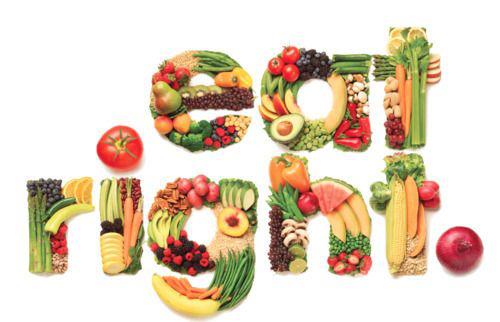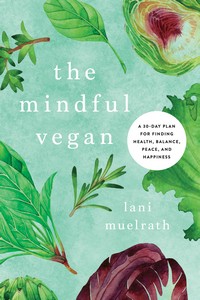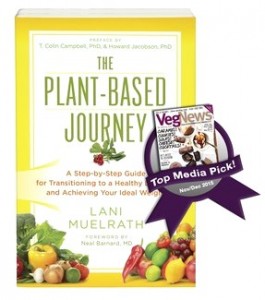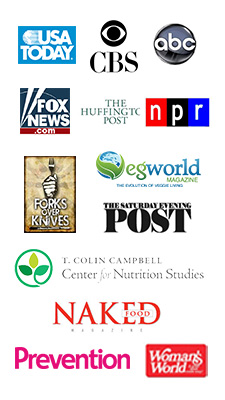Which Plant-Based Food Plan is Right For You?
Have you noticed that the more popular whole food plant-based eating becomes, the more it can seem that ‘plant-based diet’ can mean one thing to one person, another thing to someone else?
It might even seem like everyone and his plant-based brother has staked their claim on which variation-on-the-plant-based-theme is ‘best’.
With the flood of emails on this topic reaching critical mass in my inbox, now seems a good time for us to sit down and talk about it.
Maybe your plant-path is clearly marked.
Yet perhaps you – or someone you know – could use a hand in cutting a trail through the culinary confusion.
Let’s take this email from ‘Curious in the Midwest’ to set the stage for sorting through the maze of making good choices about what to eat – within the context of a plant-based food plan – so you can easily discover which plant-based food plan is right for you.
Hi Lani,
I have a question for you that has been mulling in my mind.
I was vegetarian for over 20 years and am now adopting a whole foods plant-based diet. Can you explain the differences in the various WFPB [whole food plant-based] author’s views?
There seems to be discrepancy around incorporating nuts, salt, flours, sweeteners and calorie counting as well as the prescribed amount of green vegetables in one day.
There seems to be agreement on many things, but each person has their own tweak. I wonder about this and am getting more and more confused. If I am confused as a former vegetarian and pretty well informed about the influence of food on my body, I can only imagine how confusing this must be to someone trying to switch from a Standard American Diet.
Thanks for your response!
Curious in the Midwest
Dear Curious,
You’re right. On the face of it, there appear to be several ‘styles’ of plant-based food plans. This can lead to the confusion you are experiencing, and I’m glad you’ve asked the question.
Between you and me, the last thing we want to do is make switching to plant-based eating more complicated.
You can easily cut through the confusion when you look at your choices through the lens of what you want to achieve with your switch to eating plant-based.
From there, it starts with simply eating more whole plant foods and less of everything else. Yet we can get obsessive about ‘getting it right’, forgetting that ‘all or nothing’ often leads to ‘nothing’.
I’m not a plant-based hair shirt. When it comes to getting animal products off our plates, that’s one thing. This can be done quickly and easily with a few simple swaps so that you can keep enjoying most of the foods with which you are familiar – which is why The Plant-Based Journey is so rich in ideas for how to do just that.
Yet if everyone is ordered right out of the gate that every grain of salt and sugar has to go along with all the animal products, the fried fluffernutters, and all the other beasts of the modern feedbag, the plant-based movement is dead in the water.
Now that we have some perspective, we are in better position to look at the these differences in plant-based food plans – so that you can move from plant-perplexed to plant-positive, and more easily flow into what’s best for you.
What the plant-based food plans have in common
First, as you note, let’s be mindful of the commonalities of each of these approaches.
They are 99% on the same page.
If you look at all edibles as being in one of three groups: 1) whole plant foods 2) animal products and 3) highly processed – a brilliant viewpoint I learned from Dr. T. Colin Campbell when I interviewed him for The Plant-Based Journey – it simplifies things.
Each variation-on-the-theme that you mention advocates predominantly #1 – whole plant foods – and eschews #2 and #3, animal products and highly processed foods..
From there, simply filter the different ‘flavors’ of plant-based eating through the lens of what it is you want to achieve by eating a plant-based diet.
In other words, what are your goals with going plant-based?
People start on the plant-based journey for various reasons. These reasons usually fall into one or more of these three categories:
- health and weight loss
- the lot of animals
- environmental concerns
Whatever your personal goals are will influence which plant-based food plan you make yours.
Let’s take a look at the different items you’ve listed in your question through the filter of personal reasons for going plant-based: nuts, sweeteners, salt, flours, and calorie counting.
Is weight loss and improved health desired?
First, we’ll run the items on your list through a Checkpoint Charlie from the weight loss and improved health perspective. Then we’ll consider them from the viewpoint if weight loss is not the driver behind switching your diet to plant-based.
To get hunger satisfaction with a calorie load that helps you achieve your ideal weight, you want lots of fiber and low calorie concentration in foods. Whole plant foods do this quite nicely – some better than others.
Nuts
Nuts, seeds, nut butters, and other high fat plant foods such olives, and avocados give you lots of energy in relation to the fullness they provide.
Next to vegetable oils (which is in the highly processed category) they are the first thing to be aware of in terms of watching quantity of consumption when weight loss is desired. (See the rules of satiety section in the video presentation How To Amp Down Your Fat Genes With Plant-Based Nutrition for more about energy density in food and how it can affect your weight.)
Here’s where awareness of calorie content is important, which is not the same as calorie counting.
But we’ll get to that in a minute.
For those with health considerations such as heart disease, curtailing or eliminating nuts and high fat plant foods may be advised by your health care provider or dietitian.
Sweeteners and Salt
Sweeteners can also jack up the calorie content of what you eat fast, though not to the extent that high fat foods do. They can make your plate so hyper-tasty that you want to keep reaching for more just for the taste sensation, hampering weight loss.
Though you didn’t mention specific sweeteners, they can vary from maple syrup to agave syrup to date paste. Two out of those three are actually fiber-free.
In my book, that doesn’t make these concentrated sweeteners taboo. It simply puts them in the category of condiment. That means as flavor agent, minimally used.
If modest amounts of these flavor agents helps you be more successful at eating most of your calories from whole plant foods, then they can provide a positive function.
It is the same with salt – it is a flavor agent that, when added to food – just as with sweeteners – drives up your interest in what’s on your plate.
Typical Standard American Diet fare is massively over-salted and over-sweetened, and has been strongly linked to disease of modern western civilization, as reported by the Select Committee on Nutrition and Human Needs:
Too much fat, too much sugar, or salt can be and are directly linked to heart disease, cancer, obesity, and stroke among other killer diseases. In all 6 of the 10 leading causes of death in the United States, they have been linked to our diet. Those of us in government have an obligation to acknowledge this.
When switching to a whole foods plant-based diet, recalibrating your tastes to less salty, sugary fare is a natural progression.
Does this mean that all salt and sugars need to be eliminated from any food you consume? Must everything be sugar-free (already addressed) and salt-free?
The salt and sweeteners discussion is often within the context of ‘food addictions’, a topic I address in more depth in The Plant-Based Journey.
Let’s talk a little bit more about the that.
What about food addictions?
Briefly, “food addictions” can be a serious point of concern and not to be undervalued. For some, eliminating added salts and sugars helps them to control their food intake. They may report that a little salty or sweet seasoning drives them to overeat, and they are better off with plain fare.
Yet if you find salt or sugar does not create such a problem for you, and a little salty or sweet on your food makes your plant-based plate more interesting and delicious, then you can make your decision accordingly.
It is not my intention to diminish the experience of those who have found success with managing overeating from an “addictive” perspective.
However, many people sell themselves short of opportunity by not exploring other potential avenues for redress.
I know this from personal experience.
I used to consider myself horribly addicted to sweets, a helpless emotional over eater. At one time I regularly attended Overeaters Anonymous to try to get a grip on the problem.
Heavens, how things have changed.
Eating well and developing mindfulness have completely shifted this for me. It may well do the same for you.
In short, when it comes to sweet and salt:
Just because the taste of something is compelling doesn’t mean you have to compulsively eat it.
No matter how many times you may have connected these as one and the same in the past.
This may demand you invest in cultivating a mindfulness practice and developing some degree of mastery over eating practices, which is my approach to eating freedom – and at a slender weight.
Flours
When a whole grain is broken and goes through the processing to become a flour, the more finely the whole grain is ground, and the more it can present calorie load challenges due to the finer particles of the grains. (See The Processed Continuum chapter in The Plant-Based Journey).
Keep in mind we’re still talking whole grains – not highly processed, de-fibered white flour.
Some people find that when they make most of their whole grain consumption from intact, non-ground whole grains, they have more success with weight loss.
But that can be confounded with the apparent weight-loss effect of upping bread in your diet, quite possibly because it crowds out some lesser-quality fare. The Eat More Starch Challenge: Eat Twelve Pieces of Bread Daily to Lost Ten Pounds Monthly makes an interesting read for that very reason.
It is also heartening to die-hard bread lovers, such as yours truly.
As a matter of fact, as you may have noted on my home page, I ate bread every single day of my fifty pound weight loss.
I didn’t eat twelve pieces a day. But I believe in good bread as fundamental to good living.
So there you have it. Make your own decisions about bread and whole grain flour products in your diet based on your own goals and experience.
Amount of green vegetables in one day
Almost without exception, when my clients start to up the vegetable content of their diets to a minimum six or seven servings a day, weight loss is a result. This is because this practice starts to crowd out the other high calorie, low fiber fare that they may be used to eating.
This is not the same as pounding down massive quantities of green vegetables before dawn in a Herculean effort to drive down the calorie content of your daily intake.
At one time, I aspired to the practice of consuming several pounds of greens and other non-starchy vegetables a day while limiting starchy vegetables.
Without the hunger satisfying quality of enough beans and legumes, brown rice and potatoes, I was one hungry animal and this practice quickly shifted my consciousness into ‘dieter’ mode.
I couldn’t stop thinking about bread and brown rice. This experience is the thinly veiled subtext in my article titled My McDougall Diet Failure, which gives you the full skinny on my experience – and tells you what I did to change it and gain control of my weight.
Between you and me, when a blog article comes across my radar that reads something like “…if I have to gag down another pound of vegetables for breakfast…” I know that I am not alone in this experience.
There are some people who thrive on this practice of mountains of vegetables before noon.
My advice is to adopt the approach that works for you.
To me,”working for me” means hunger satisfaction, eating enjoyment, not forcing myself to graze through a field of greens before my oatmeal and toast, and freedom from obsessing and compulsiveness about it all.
It means never ‘gagging down’ anything.
Calorie counting
Though calories do count, a whole food plant-based diet liberates you from obsessive daily calorie counting.
Yes, there are people who swear by counting, weighing, and measuring everything they eat and have a great deal of success with it – and that includes people who eat a plant- based diet. Far be it from me to criticize if that’s what works for them.
Personally, as someone who counted calories for years, I came to a calorie-counting-crossroads years ago when it became clear to me that it was not the way that I wanted to live day in and day out.
I have stacks of journals in the back of my closet that are recorded testimony to years of counting calories, and periodically macronutrients (protein, fats, and carbohydrates) as well. This was all aimed at micromanaging my dietary intake, a testament to my devoted efforts to gain once and for all control over my weight.
Years – decades, even – of these practices not only did not bring me the success at weight management that eating whole foods plant-based have, they also didn’t deliver the eating freedom and quality of life that I craved when it came to food, eating, and my body.
If someone has told you that daily counting of calories is essential for weight management success, then that is because they have found that to be successful for them.
It does not make it a hard-and-fast rule for weight control with a plant-based diet. If you like playing with the numbers, and it delivers to you the quality of life you want, fine.
Personally? Daily calorie counting sucked all the juice out of enjoyment of my food, leaving me with the scraps.
If this has been your experience too, take heart.
There is another way.
Smoothies
Though you didn’t mention smoothies in your list, this question comes across my desk frequently as well.
Dr. John McDougall says “You don’t improve vegetables by hacking them to bits with a steel blade.”
This quip from Dr. McDougall always evokes roars of audience laughter. I appreciate this comment because the good Dr. McDougall is so good at keeping us from getting distracted from the objective – to eat more whole plant foods and less of everything else.
At the same time, a smoothie can have it’s proper place for getting more vegetables on your plate.
Some people thrive on a green drink as a tried-and-trusted way to start their day; some people find too much ‘smoothie’ gets in the way of their weight loss goals. For an in-depth discussion and more on the smoothie issue, see To smoothie or not to smoothie? The skinny on blending your fruits and greens.
But don’t let yourself get distracted and sidelined with this little side trip on the plant-based journey.
Perfection is a back door escape mechanism
Long short, when it comes to these minor variations on the plant-based food plan theme – discover what works best for you.
Don’t be afraid of a little experimentation to find out what that is.
Obsessing over getting it ‘perfect’, and buying into the compulsion to know what exactly what ‘perfect’ is before you get started, only delays your progress. Often it halts progress altogether, because we can use it as an excuse to not take action. Better to simply do your best, trusting that you’ll figure out what’s best for you as you go along.
For the lot of animals and the environment
If your weight and health are not your drivers for your switch to eating plant-based, then many of the above may not be your concern.
You simply want to cause less harm and understand the serious implications to our environmental health and planet that continuing to eat high on the food chain present.
A varied, tasty, and enjoyable variety of foods from the The 5 food groups: My simple plan for a whole foods, low-fat, plant-based diet is all you need.
Which plant-based plan for you?
A big thanks to Curious in the Midwest and everyone else who has written regarding plant-based food plan confusion for prompting this article.
I hope it has cleared some clutter and assisted you in discovering how the commonalities outweigh the differences with these slight different points of emphasis within the plant-based nutrition realm. And I hope it has helped you clear up any confusion.
Enjoy what you eat!
P.S. What have you found to be right for you? Feel free to piggy-back your questions or comments on Curious’ letter and my reply in replies below. Let me know if this has helped clarify and if there are other questions you have that I might help with.



















This has come at a perfect time for me. Thank you to “Curious” for putting my confusion into a great question. And thanks Lani for answering it in your characteristically clear style.
I’ve got to say, the comments about ‘perfection’ really jumped out at me. That’s so true!
Sandra, I’m so glad to hear that this is good timing or you.
And about the perfection – I know! This used to be so true for me, and I’m looking back decades of dieting. Sheesh! thanks for your comments.
Nice explanation of all! I started veg for the animals and found plant based in about 2003 and loved the health aspect but found I definitely needed to do what worked for me (I.e. I drink a frozen banana kale smoothie daily to up my veggies and feel like I’m getting ice cream lol) because I was beating myself up for not following what I thought I should. I’m a healthy weight and in great shape, so that’s the ultimate prize and more importantly the animals win which means more to me than anything in the world!
Cathy,
I love this! You demonstrate a perfect example of finding out what works for YOU and being true to the principles of humane living along with health. It’s so good for others to see the individuality that can be achieved – and how we can abandon so many of the ‘shoulds’ – they can be so unnecessary – and you model and share an example of that. Thank you!
Thank you Lani..I thought this was a perfect article. I think people get carried away with what is the perfect solution and become terrified that they are “doing it wrong”..The bottom line for weight loss for me is calorie density because I like to eat a lot.I felt your blog post articulates exactly how I feel..
Hi Lani (I like your name!:-)), thanks and it sounds like you could have written it! The terror of ‘doing it wrong’ is a huge block, as you say. Enufawreddy! Let’s eat!
I appreciate you sharing your thoughts!
It’s good to bring to light all the confusion that the new plant-based movement is giving people. Those discrepancies are just dogma. Unless someone has a serious health condition there is no need to restrict and remove entire food groups. I’ve seen far too many people get sick or just completely frustrated from restricted diets and go back to eating flesh.
I’ve been vegan for 13 years and follow the 80/20 rule. 80% of my diet is whole plant foods, 20% is fun vegan food. I wouldn’t have it any other way because life is to be enjoyed. I’ve been in perfect health following this method. I fear for those new to the plant-based diet who hear no, no, no this, no this. Let’s focus on the bountiful foods we can eat. Yes, yes, yes.
Christy,
Thank you so much for coming here to share the comments you so generously shared about this article on facebook. I love your attitude and think it is interesting to read about 80/20 in this regard – as well as mentioning the health condition caveats.
For readers who haven’t met Christy, she is a renowned plant-based chef, author, and excels in the fitness connection, too. You can enjoy more from Christy at her website here: Blissful and Fit.com.
Thanks again for sharing the love!
Very good read…..I’m a low carb vegan, not trying to loose weight. I’m very interested in the 80/10/10 approach which seems to be a great choice for runners!!!! What are your thought on all of that fruit sugar???
Hi RunnerDebi,
Thanks, I am glad you enjoy the article. My thoughts on fruit sugar? Not sure what your question is? I do know that Dr. McDougall says that some people need to take care with amount of dietary fruit due to their particular triglyceride profile, as some people are more sensitive in this fashion than others.
When I was interviewing Matt Lederman, M.D. (star of Forks Over Knives film) for my book, he said he has never found anyone who gains weight on fruit and encourages people to eat it freely.
I’m a big fruit fan and could eat fruit all day. Put me in front of a bushel of fresh cherries and I’d finish the whole thing! Cherries are on my mind because where we are in Italy right now there are fruiting cherry trees all over the place, even along the hill town trails that we hike every day. Me one happy cherry lover!
Hi Lani,
Great article! I am excited to see that whole food plant-based eating is getting more notice. Your clarifications are coming at a perfect time as more and more people want to try this way of eating.
What has worked for me in losing almost 100 lbs. is simply eating whole unprocessed plant-based foods. I love being able to eat until full and not have to weigh and measure anything. It has been a joy to reach a normal BMI, and the pant size I had when I was sixteen. Debby
Debby, thanks and I’m so excited for the difference YOU are starting to make in getting the word out! You are such a positive role model for plant-based living. 100lbs! Wowza!
Great article. It really puts it all in perspective for me. I am nearly 100% Mcdougall with just an occasional indulgence in 85% dark chocolate and my main vice coffee. I would really like to give it up but struggle with the social aspect of drinking coffee with friends. I can’t seem to like any tea and coffee shops and restaurants do not offer anything else the least bit healthy all heavily sweetened drinks.
Sibyl, thank you! You sound like you are doing wonderfully – honor all that you have achieved and enjoy your success! And I’ll join you for a cup of java any time. 🙂
Hi, Lani!
Love your point of view on things like this. You’re such a valuable contributor to the alternative “diet” lifestyle. Thanks!
Anita, thank you for this! Proactive and positive is what moves us forward. 20 years of teaching middle school proved this out over and over again. It means a lot to me that you took the time to share this feedback, I appreciate it so much!
Love everything about you Lani x
Wow Maria, it’s early here in Switzerland and yours is the new first message I’ve read here this morning. You know how to make a day! 🙂
Happy to be on this journey with you…
Thanks, as always Lani, for posting about perfectionism. I do find I do best when I stick with the McDougall Plan. It’s easy at home, but find a lot of resistance from relatives. Anger, even. Not sure why anyone cares about how I eat, but they do. I try to understand and take care of myself. I think they want to “cook” for me so it becomes a real problem. I like the social aspects of getting together over dinner, etc, but won’t compromise. I guess I can understand when I think of how much I care about how they eat and wish they’d do better.
I’m looking forward to your new book. I got the review. Enjoying it very much. Thanks, again. Lynn
Hi Lynn,
You bet. It seems to be something we can use continued support for – the ‘perfect’ thing. It somehow makes us feel more like doing better, doesn’t it?
Sorry to hear about your experience with the relatives. It would be interesting to hear how the conversation goes, kind of like a fly on the wall. Maybe you could use some new phraseology. Or maybe this is just so locked in that all you can do is shift your inner response so it isn’t so uncomfortable, which is where it can be hard to let go. How does the anger show up? This might be an interesting exploration for others to hear about. Definitely a rocky road portion of the journey. I’ve always maintained that other people actually don’t really care about what you are eating, but the food becomes a vehicle for other issues between people and within themselves. If you are becoming more conscious of your food choices, others can feel like it’s a criticism of them. But it’s not your job to make them feel more comfortable with themselves – it’s just a nice skill if you can get it so you can get through the meal!
So glad you got the review, so glad you like it. Did you pre-order? Be sure to hang onto your receipt(s) – bonus gifts coming soon!
I love reading what you have to say, because I really relate to your story. I too gain weight easily. I too have had times of being quite thin, but I had to obsess about food portions/calories to do it. I too just wanted to be healthy and not hungry AND I started intuitive eating and gained a lot of weight! I eventually lost 20 pounds of that weight while still eating anything I wanted.
Then, for moral reasons. I changed to a plant based diet. I appreciate your more moderate approach so much. I had success with eating plant based for awhile. I ate a green smoothie every morning and a mix of other plant foods, including nuts during the rest of the day. I lost 15 pounds and felt good. But then a little dis-ordered thinking snuck in. I decided I wanted to do better (be thinner and more *perfectly* healthy) and I started investigating. Unfortunately, I have a temptation to try for perfection and ability to be very regimented — for awhile. And unfortunately there are a lot of voices pushing perfection in the plant based movement.
I tried the Nutritarian diet which limits starches and grains to one serving a day. I tried Chef AJs way which cuts out all salt and sugar. It’s just not healthy for me to be so strict. After about a year, I just got sick of being so strict and of feeling unsatisfied, and of forcing down food I didn’t feel like eating. (I’m glad it works for some people, it just didn’t work for me.) I *binged* and gained all of the weight back.
I was healthy and at peace with my eating before I tied to be so strict. I need to put up a reminder for myself not to be too strict with my eating because it makes me unhappy. It’s not how I want to live. Moderate wholesomeness works best for me! I’m ready to give that a try again after totally giving up and eating junk food vegan whenever I feel like it.
April,
I appreciate you sharing your story here. You give a perfect explanation of how pushing to an ideal that may not really be the best match for you personally can backfire. It’s painful, I know! I look forward to hearing from you as you move forward on your own path. There is so much healthful food to choose from without having to touch animal products and also without restricting ourselves from a wide variety of healthful plant-based foods, and you are testament to that. Please keep me informed as things move forward and I am so glad you shared your thoughts here!
topan33 presents exciting slots that explode with big wins!
Netpedia33 be like: spin small, win tall 💸 jackpot vibes only.netpedia33